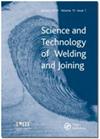Evaluation of resistance spot weldability and weld performance of zinc-coated martensitic steels
IF 3.7
3区 材料科学
Q2 MATERIALS SCIENCE, MULTIDISCIPLINARY
Science and Technology of Welding and Joining
Pub Date : 2023-10-15
DOI:10.1080/13621718.2023.2264565
引用次数: 0
Abstract
AbstractThis paper explores the resistance spot weldability of three martensitic (MS) steels of 1500 MPa tensile strength. A weld diameter versus current plot was developed for the three MS steels to investigate their weldable current range and expulsion characteristics. The mechanical performance of the welds was investigated using cross-tension, tensile-shear and hardness tests. It was found that the differences in electrical resistivity during the nugget growth period influenced the expulsion limit and, consequently, the weldable current range. The three MS steels failed in pullout failure mode but exhibited different plug ratios. Finally, the mechanical strength of the three MS steels was observed to be better than the other advanced high-strength steels (AHSS) such as DP600, TRIP1000 and PHS1500 steels.KEYWORDS: Advanced high strength steelweldabilitymartensiteliquation crackmartensitic steelprior austenite grain sizeexpulsion AcknowledgementThe authors are very grateful to Mercedes-Benz AG for financially supporting this research.Disclosure statementNo potential conflict of interest was reported by the author(s).Additional informationFundingThis work was supported by MBUSI.镀锌马氏体钢电阻点焊性能及焊接性能评价
摘要本文研究了三种抗拉强度为1500mpa的马氏体(MS)钢的电阻点焊性。建立了三种MS钢的焊缝直径与电流关系图,研究了它们的可焊电流范围和排出特性。通过交叉拉伸、拉伸剪切和硬度试验对焊缝的力学性能进行了研究。结果表明,熔核生长期间电阻率的差异影响了出焊极限,从而影响了可焊电流范围。3种MS钢均为拔出失效,但拔塞率不同。最后,三种MS钢的机械强度优于其他先进的高强度钢(AHSS),如DP600、TRIP1000和PHS1500钢。关键词:先进高强钢可焊性马氏体液化裂纹马氏体钢优先奥氏体晶粒排出感谢作者非常感谢梅赛德斯-奔驰公司在经济上支持本研究。披露声明作者未报告潜在的利益冲突。本研究得到了MBUSI的支持。
本文章由计算机程序翻译,如有差异,请以英文原文为准。
求助全文
约1分钟内获得全文
求助全文
来源期刊

Science and Technology of Welding and Joining
工程技术-材料科学:综合
CiteScore
6.10
自引率
12.10%
发文量
79
审稿时长
1.7 months
期刊介绍:
Science and Technology of Welding and Joining is an international peer-reviewed journal covering both the basic science and applied technology of welding and joining.
Its comprehensive scope encompasses all welding and joining techniques (brazing, soldering, mechanical joining, etc.) and aspects such as characterisation of heat sources, mathematical modelling of transport phenomena, weld pool solidification, phase transformations in weldments, microstructure-property relationships, welding processes, weld sensing, control and automation, neural network applications, and joining of advanced materials, including plastics and composites.
 求助内容:
求助内容: 应助结果提醒方式:
应助结果提醒方式:


